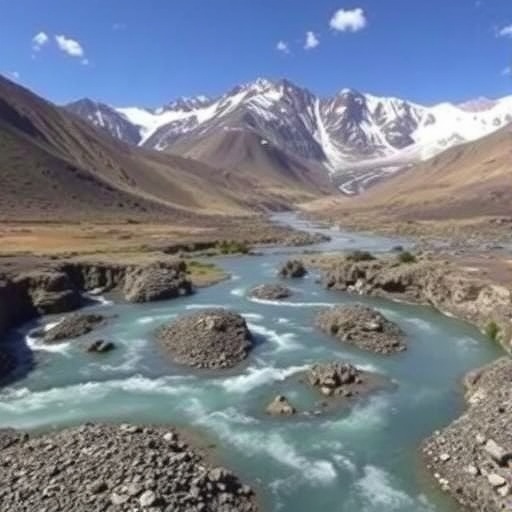A recent study authored by Wang, Hu, Chen, and their colleagues highlights the alarming water crisis unfolding in the south-central Andes, linking it to the phenomenon known as Antarctic amplification. The findings, published in the journal Commun Earth Environ, reveal that the current water scarcity in this region is unprecedented in the last eight centuries. Researchers have utilized a wide array of data, combining historical records, climate models, and contemporary observations to piece together the environmental changes that have led to this crisis.
Antarctic amplification, the term used to describe the pronounced warming occurring in the Antarctic region compared to the global average, has far-reaching impacts that extend beyond polar boundaries. As temperatures rise in Antarctica, significant ice melt contributes to elevated sea levels and alters atmospheric circulation patterns. These changes have cascading effects on weather systems and precipitation patterns around the globe. The study points to an alarming correlation: as Antarctica warms and loses ice mass, regions like the south-central Andes face drastic shifts in their water availability.
In the Andes, a range of interconnected factors influence hydrology. Temperature variations affect the snowline, while changes in precipitation dictate how water resources are replenished. The research indicates that there has been a notable decline in snow accumulation and an increase in rain instead of snow. This trend leads to accelerated runoff, diminishing the snowpack’s ability to sustain river flows during periods of reduced rainfall. The implications for agriculture, drinking water supply, and ecosystems in the region can’t be overstated.
As these environmental shifts continue, the crisis in the Andes becomes more pronounced. Researchers detail that the Andes supply water to millions of people, serving as the lifeline for agriculture, energy production, and drinking purposes. The interdependence of climate systems means that affected regions cannot isolate themselves from the global changes initiated by phenomena like Antarctic amplification. Wang et al. emphasize the need for immediate action as they project that the water crisis will likely exacerbate if current trends continue unchecked.
Adaptive strategies are highlighted as critical in navigating these challenges. Communities are urged to rethink their water management techniques and engage in sustainable practices that consider the changing climate. Reservoirs, water conservation measures, and improved irrigation systems could mitigate some of the adverse effects. However, the study underscores that such adaptations may not be sufficient without addressing the root cause—the accelerating temperatures driven by global climate change.
The researchers engaged with local populations to better understand the on-ground realities and the societal impacts of this water crisis. Interviews and surveys indicated that rural communities are feeling the brunt of these changes. Farmers report reduced yields due to inconsistent water availability, while urban areas experience increased competition for dwindling resources. The need for policy interventions to foster resilience among vulnerable populations has never been more apparent.
Climate models played a crucial role in the study, allowing researchers to simulate future scenarios based on varying levels of greenhouse gas emissions. The results indicated that if levels continue to rise, the south-central Andes may experience even lower water levels, significantly impacting ecosystem services and human livelihoods. Wang and colleagues call for further research to understand these mechanisms and to develop predictive models that could serve as early warning systems for impending water shortages.
International collaboration is necessary to address this crisis effectively. The researchers suggest that countries sharing the Andes mountain range must work together to create transboundary management strategies for water resources. These collaborative efforts can help ensure that water scarcity does not lead to conflict over resources, a risk that looms on the horizon if current trends persist.
Overall, the work of Wang et al. sheds light on a critical, yet often overlooked, consequence of climate change. The study goes beyond merely highlighting the severity of the situation; it poses profound questions about our approach to environmental stewardship and resource management in a changing world. The urgency for transformative action to combat climate change—to mitigate its impacts on vulnerable regions like the south-central Andes—cannot be overstated.
By connecting the dots between Antarctic amplification and water scarcity in distant mountain ranges, this research serves as a vivid reminder of the interconnectedness of our planet’s systems. The challenges faced by the Andes might reflect those experienced elsewhere, indicating a widespread need for concerted global efforts to tackle climate change head-on. The researchers’ proactive recommendations serve as a clarion call for action, making it clear that without immediate intervention, the water crisis in the Andes may only be a precursor to more significant challenges facing the world.
As discussions around climate policy, resource allocation, and community resilience continue to evolve, the findings from this research provide essential perspectives and a framework for addressing some of the most pressing environmental challenges of our time.
Subject of Research: The impact of Antarctic amplification on water crisis in the south-central Andes.
Article Title: Recent south-central Andes water crisis driven by Antarctic amplification is unprecedented over the last eight centuries.
Article References:
Wang, S., Hu, M., Chen, F. et al. Recent south-central Andes water crisis driven by Antarctic amplification is unprecedented over the last eight centuries. Commun Earth Environ 6, 937 (2025). https://doi.org/10.1038/s43247-025-02858-1
Image Credits: AI Generated
DOI: https://doi.org/10.1038/s43247-025-02858-1
Keywords: Antarctic amplification, water crisis, Andes, climate change, environmental impact, community resilience, transboundary water management, climate models.




